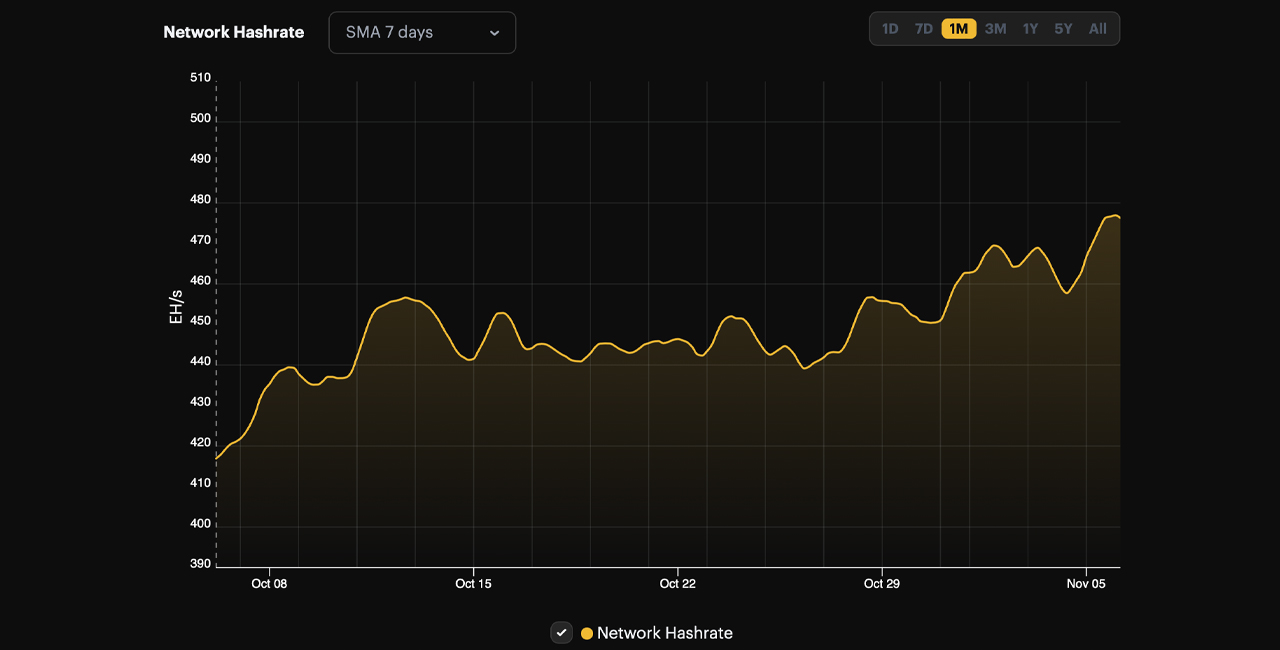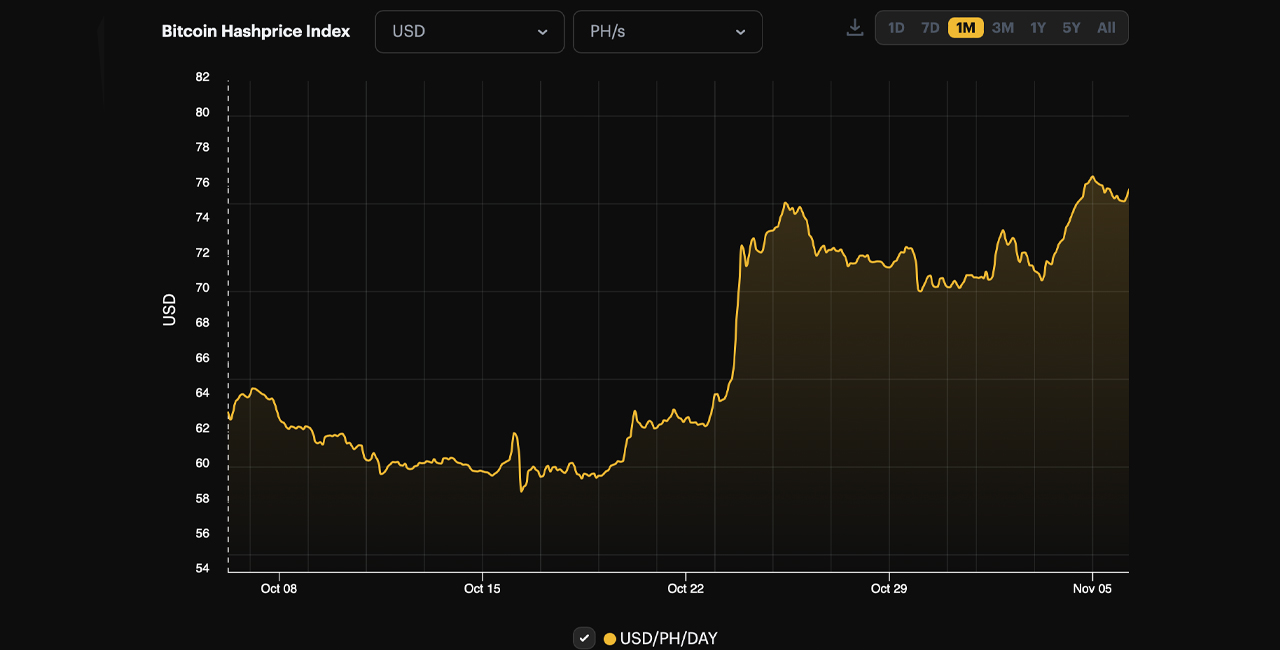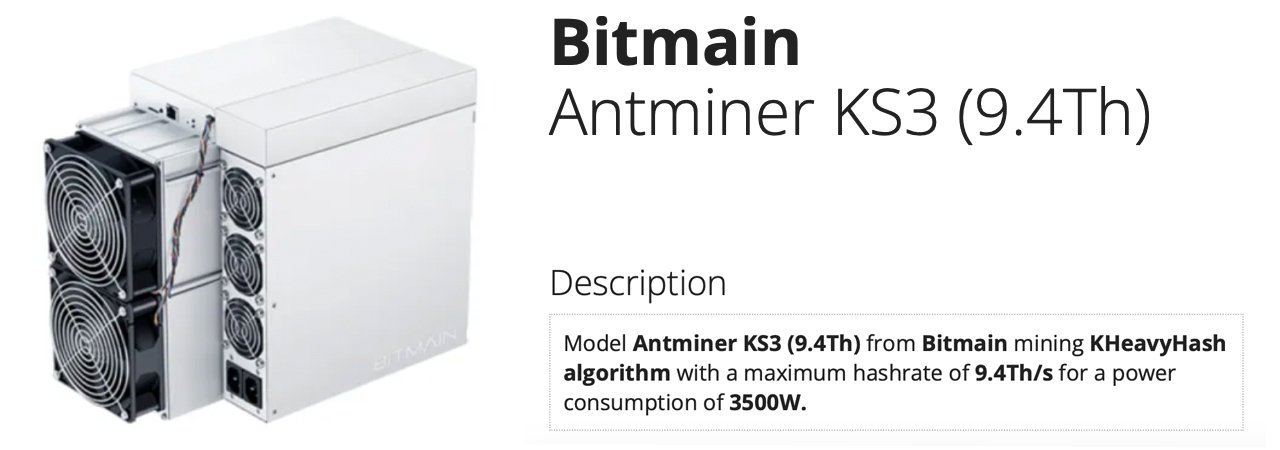As the year 2023 winds down with just 55 days remaining, bitcoin mining has surged in profitability, with a return of $76 in daily earnings for every petahash per second (PH/s) as of November 5. A mining device capable of 200 terahash per second (TH/s) with electricity expenses at $0.07 per kilowatt-hour (kWh) is poised to net an estimated $14.12 over a full day at prevailing BTC rates.
Bitcoin and Kaspa Mining Profitability Swell as Miners Eye Lucrative Returns
Per the insights from hashrateindex.com, the seven-day average for Bitcoin’s hashrate has soared to 474 exahash per second (EH/s). In a scenario where each miner operates at 200 TH/s, the total would be equivalent to about 2.37 million such devices in operation.

Bitcoin’s network hashrate on November 6, 2023.
It’s important to remember that not all mining rigs maintain a steady 200 TH/s — actual outputs can significantly fluctuate by model, with some yielding much lower and others exceeding 200 TH/s.

Bitcoin’s hash price per petahash per second (PH/s) on November 6, 2023.
Take, for example, the veteran S9 Antminer, which has been in service since its release in May 2016 and operates at 12.93 TH/s. Even with its vintage status, at an electricity cost of $0.07 per kWh, this old-timer can still muster a modest daily profit of $0.91 based on the current BTC exchange rates.
On the other hand, the more advanced and hydro-cooled Microbt M63S, with a range of 360 to 390 TH/s, can generate profits upwards of $25.41 each day on the lower end of its capacity. Unless you’re part of a significant mining enterprise, acquiring the latest Microbt M63S will be off the table until the coming year. In a similar vein, Bitmain’s latest offering, the S21 Hyd, which boasts a hashing power of 335 TH/s, won’t be available until February 2024.
While a 335 TH/s hash rate may yield $23 in daily earnings at present rates, the future profitability by its release date remains uncertain. Meanwhile, two machines have been established in the market for a while: Bitmain’s Antminer S19 XP Hyd, with 255 TH/s, and Microbt’s hydro-cooled M53S++ offering 320 TH/s.
Current figures from minerstat.com show that the S19 XP Hyd can generate a daily profit of $18, whereas the M53S++ can achieve $22.59. Bitcoin miners dedicating their computational power to mining are indeed reaping profits, yet those mining the digital currency kaspa (KAS), utilizing the Kheavyhash algorithm, are topping today’s profitability charts.

The Bitmain kaspa (KAS) ASIC miner with 9.4 TH/s or 9,400,000 MH/s.
A Bitmain Antminer KS3, which has a hashrate of 9.4 TH/s or 9,400,000 megahash per second (MH/s), is estimated to earn an estimated $156 daily in profits. Factoring in an electricity rate of $0.07 per kWh, a miner can expect to earn around $16 per day for every terahash of effort expended.
What do you think about the increase in profitability for Bitcoin’s and Kaspa’s proof-of-work (PoW) networks? Share your thoughts and opinions about this subject in the comments section below.





















































































cost generic clomiphene without insurance can i order clomid prices how to get cheap clomiphene pill where buy cheap clomid tablets where to get generic clomiphene without dr prescription clomiphene cost how to buy clomiphene price
More articles like this would make the blogosphere richer.
Thanks an eye to sharing. It’s top quality.
zithromax uk – where can i buy tindamax buy metronidazole 400mg without prescription
order semaglutide 14 mg pill – oral cyproheptadine 4mg cyproheptadine ca
motilium for sale online – buy generic motilium online cheap cyclobenzaprine
order inderal 10mg generic – buy plavix generic methotrexate 2.5mg pill
purchase amoxil online cheap – buy amoxicillin sale cost ipratropium
azithromycin 500mg brand – oral tindamax 300mg order nebivolol 5mg online
augmentin pills – https://atbioinfo.com/ buy acillin cheap
nexium for sale – anexamate buy esomeprazole 40mg without prescription
warfarin 2mg without prescription – https://coumamide.com/ cozaar 50mg cheap
meloxicam 7.5mg pills – https://moboxsin.com/ buy meloxicam pill
prednisone 5mg without prescription – https://apreplson.com/ order deltasone 5mg pill
cheap erectile dysfunction – erectile dysfunction pills over the counter can you buy ed pills online
amoxicillin generic – https://combamoxi.com/ cheap amoxicillin pills
buy diflucan 200mg without prescription – https://gpdifluca.com/ cost fluconazole 100mg
generic cenforce 100mg – buy cenforce 100mg online cheap where to buy cenforce without a prescription
cialis vs sildenafil – ciltad generic cialis cheapest price
free cialis samples – https://strongtadafl.com/# generic cialis available in canada
buy generic ranitidine online – https://aranitidine.com/ buy zantac
can you buy viagra chemist – https://strongvpls.com/ cheap viagra mexico
This is the kind of criticism I in fact appreciate. click
More posts like this would make the blogosphere more useful. https://ursxdol.com/prednisone-5mg-tablets/
I am in point of fact delighted to gleam at this blog posts which consists of tons of profitable facts, thanks for providing such data. https://prohnrg.com/product/diltiazem-online/
I am in truth enchant‚e ‘ to glance at this blog posts which consists of tons of worthwhile facts, thanks towards providing such data. https://aranitidine.com/fr/acheter-cenforce/
This is the tolerant of advise I recoup helpful. https://ondactone.com/simvastatin/
I’ll certainly return to review more.
buy toradol online cheap
This is the kind of criticism I rightly appreciate. http://bbs.51pinzhi.cn/home.php?mod=space&uid=7059413
dapagliflozin 10 mg without prescription – purchase forxiga online cheap order forxiga 10 mg sale
orlistat usa – site xenical 120mg uk